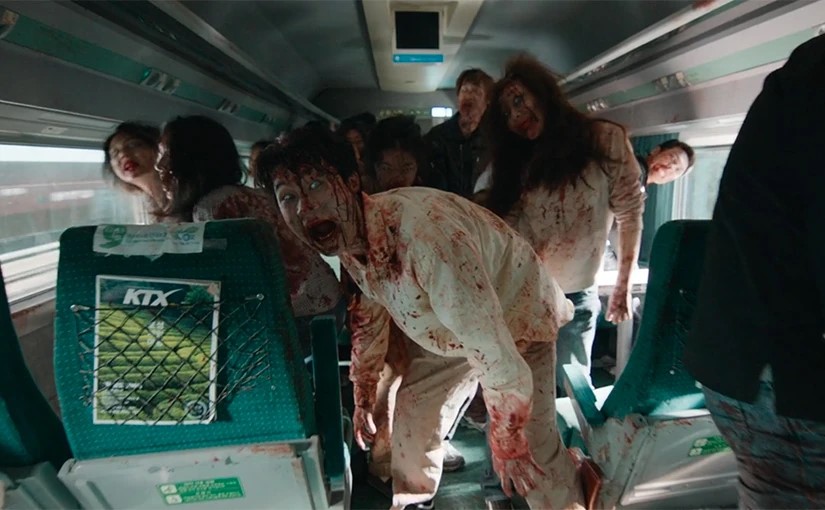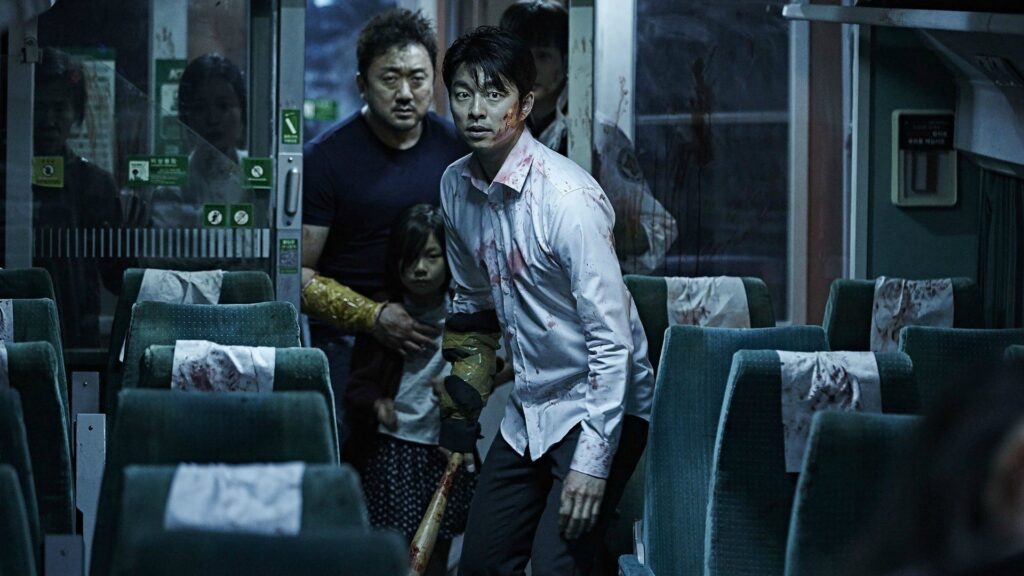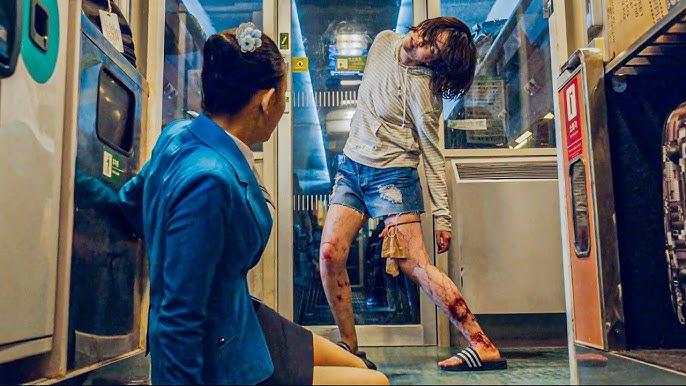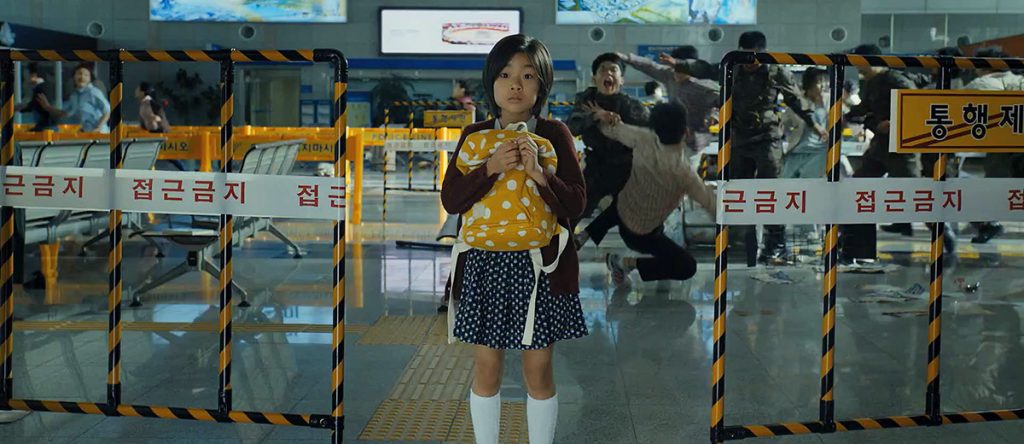|MH Rowe|

Train to Busan plays at the Trylon Cinema from Sunday, October 27th, through Tuesday, October 29nd. Visit trylon.org for tickets and more information.
In the pantheon of suspected or perhaps nonexistent genres of film, one of my favorites is the foreign film that has the copy-pasted soul of a Hollywood blockbuster but feels strangely fresh and new. Such films relieve me of the burden of familiar movie stars. They relieve me temporarily of the peculiarities of American happy endings. While they do embody the American-style will to entertain one finds in certain big-budget Hollywood films, the proportions are attractively altered. Maybe they’re a little more dramatically serious; on the other hand, maybe they’re a lot goofier; maybe they’re more sentimental, maybe less. Maybe they’re bloodier, maybe they’re more religious. They’re exactly like American films, except they’re unmistakably and sometimes uncannily different. Not better. Not worse. But sometimes worse—and sometimes way better. Roar Uthaug’s disaster film The Wave (2015) is an ideal instance of the genre. The film couldn’t be a more sincere and familiar disaster film, yet it has a pleasant veneer of novelty and credibility in its story of earthquakes, landslides, a tsunami in a Norwegian fjord, and the irrevocable drowning of human infrastructure. Yeon Sang-ho’s Train to Busan (2016) is another and perhaps even more effervescent exemplar.
Train to Busan really isn’t anything other than what it appears to be: a zombie film that takes place almost entirely on a South Korean train, which is being predictably overrun by zombies. The main protagonist is Seok-woo (Gong Yoo), a cynical fund manager delivering his sad daughter Su-an (Kim Su-an), who is heartbroken over her dad’s ghostly presence in her life, to her mother in Busan. His character arc has him starting out as an undead dad, coming back to life as a father, and then—well, I won’t spoil the formulae. This all happens of course in the middle of a zombie plague that has conveniently begun to ravage South Korea.
Other characters include a nervous but ultimately steely pregnant woman (Jung Yu-mi), her macho but tender-hearted husband (Ma Dong-seok), as well an asshole corporate executive, a resourceful teenage baseball player, and his plucky almost-girlfriend. When it’s scary for someone in the film to turn into a zombie quickly after being bitten, they turn into a zombie right away. When it’s more dramatic or emotional for someone to turn into a zombie slowly, then of course they turn into a zombie at a pace that betrays how arbitrary everything in the film actually is.

And yet for an American moviegoer such as myself Train to Busan has a sort of cheap perfection. Perhaps I grew up on one too many Independence Days and Jurassic Parks. All I know for sure is that I will watch Train to Busan at almost any opportunity, for the film is inexhaustibly entertaining, a perfect machine for producing old-fashioned cinematic emotions rather than the more typical zombie-movie satire. Made from some of the most familiar materials,Train to Busan lives.
First there’s the train. If the film were set in the United States, setting it on a train would seem willful rather than naturalistic, old-fashioned rather than contemporary. Sure, Americans ride trains—perhaps it would work if the setting were a subway, capitalizing on the hellish catacomb potential of dripping underground tunnels—but the idea of sleek and state-of-the-art commuter train infrastructure in a country like South Korea plays on an American sense of Asian technological prosperity and civilization. Where our news culture likes to banter about the decrepitude of American infrastructure, zombie chaos on a South Korean commuter rail feels like a jugular attack on a culture of flourishing public transport. The train attendants who help passengers to their seat even feel, in their attention to the details of their impeccable uniforms and blue neckerchiefs, like the flight attendants of mid-century American airlines, when plane travel was fashionable and sometimes luxurious. The more brightly shining the commuter backdrop, the more gruesomely dark its dissolution in undead anarchy.

The American zombie film World War Z (2013) features a momentarily electrifying zombie attack on an airplane, but an airplane is too truly cramped to be dramatically confining. The initial attack seems at the same time to exhaust the possibility of escalating violence. It becomes instantly tedious. With no places to really hide, the suspense feels faked. And there’s no way to win, as there’s too little room to maneuver. Unlike a train, an airplane has no cars or separate compartments, too few doors, and no stations. An airplane is a set piece. A train is a setting.
The second thing is the zombies, almost. The zombies represent in no real way a variation on the fast-moving zombies of the modern zombie-entertainment-industrial complex. Train to Busan does place a slight but urgent stress on zombie group consciousness. They appear to sacrifice themselves to ensure the horde’s next meal. In their mass roiling, however, the zombies do suitably nightmarish work. In one scene, they accumulate implausibly but creepily like kernels of bursting popcorn, filling a train compartment with a mounting wave ready to crack the car at its metallic seams. They burst from glass, almost by accident, and flop horribly after their prey. Yet the zombies don’t know how to open doors between train cars. Sometimes it’s creepy when the velociraptors can open doors, sometimes it’s creepy when they have no idea that doors have handles.
The third and most emotionally crucial element in Train to Busan is the father-daughter relationship at its center. Child endangerment is a cheap dramatic device ultimately, but here too Train to Busan succeeds by inhabiting the formula, not simply filling it out. There’s the painful joke of Seok-Woo giving Su-an a video game console, only for her to sadly and wordlessly reproach him because he has forgotten that he’s given her the same console twice before. The second one remains encased in shrink wrap. Seok-Woo can’t even remember his mistakes; he barely knows what they are. He’s a zombie dad, going through the motions.

The heart of the film is Kim Su-an’s performance as Su-an. She’s needy and resilient, cautious but in the end voracious with her emotional demands. She has a radical lack of instinct for negotiation—it’s the most authentically child-like thing about her—unwilling to let the undead reality take fundamental hold; in that sense, she’s the exact foil for her cynical fund manager father, who knows all too well that financial deals supporting biotech companies can end in zombie plagues. Maybe movies like this rely too easily on the idea that children will endure and absorb suffering. Maybe every zombie movie relies on the fantasy of seeing your loved ones die horribly. Yet Train to Busan reaches a pitch of sentimentality that, to my mind, is a great strength. Its final portrait of fatherly love—holding a newborn child—is at the same time a portrait of the simplest human wonder.
But Train to Busan doesn’t add to or notably revise the fundamental drama of the “zombie film.” It lacks the bleak, sardonic racial and social commentary that characterizes the twin fonts of the genre, Night of the Living Dead (1968) and Dawn of the Dead (1978). While Train to Busan may well know that society is unjust, the dramatic focus remains a KTX train crammed full of ravening zombies and living commuters driven to anxiety and paranoia. The asshole corporate executive might suggest a whiff of class warfare, sure, but like the cynical fund manager who is our hero, he ends up craving the embrace of parent and child; both are corporate assholes, socially speaking, but one is the villain and one the hero.
That said, the film’s characters have an appealing liveliness. They’re mostly free of constricting back stories and instead play archetypal roles, from the cool, cynical professional finally driven to live up to his paternal instincts to the sour, macho tough guy with a heart of gold. None of the characters are rich examples of the magic of fiction. Nevertheless, what they are inheres within it a minor dramatic arc that lends momentum to the movie as a whole—and remember that dramatically speaking the movie should be incredibly thin. In fact, it is! It’s a zombie film that takes place almost entirely on a train, which is being predictably overrun by zombies. Did we really expect anything more? That’s what Train to Busan wants to know.
Edited by Finn Odum

Love this review and the revelation of the foreign film with the copy-pasted soul of a Hollywood blockbuster. Can’t wait to take my daughter to this.